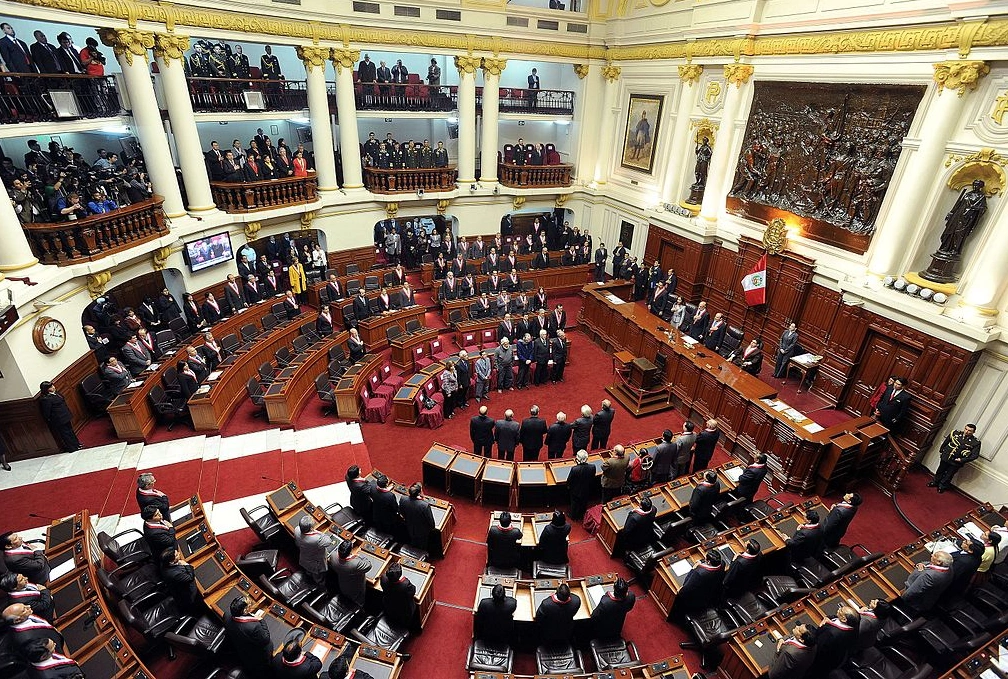Today, the Peruvian State is a booty, a prey which is tied up by the executive and legislative powers, the old and new political parties, those at the left, center and right, by the politicians in office. Meanwhile, citizens watch stupefied, passive, immobile, without knowing what to do or without being able to do anything. Public offices are being auctioned off, no longer clandestinely, but in full view and patience of the media. Public policies lie lifeless and crime is taking over the streets. How long can a State on autopilot, and in the process of internal assault and robbery last?
It seemed that we were facing a political blockade of powers that confronted a radicalized left and right, entrenched in both the government and in congress respectively. Two powers that had threatened each other with dissolution and vacancy and that had accused each other of corruption, fraud, coup d’état, mafia conspiracy.
The citizens, who could not figure out who to believe, finally suspected that both sides were right. It seemed, then, that a clash of powers was imminent, but in the end, a complicit agreement prevailed: The conspiracy and a vitiated peace. In the meantime, the belligerents decided to make the best of this political crisis.
We can trace this chaotic situation back to the results of the 2015 presidential elections, which were not recognized by the losing candidate Keiko Fujimori. Ms. Fujimori had a parliamentary majority, which was finally able to vacate President Pedro Pablo Kuczynski two years later, thus accentuating the political crisis that paradoxically lasts to this day.
The next presidential elections in April 2021 were also not recognized by the perennial loser Keiko Fujimori. The current President, Pedro Castillo —a rural professor, with no party, no program and no ideology— seemed to be staggering from office from day one of his mandate. Still, Peruvian politics took a surprising turn, which was an agreement between the radical wings.
The rationale for this understanding came from the calculation that, should any of the public authorities be able to politically eliminate their adversary, there would be an imminent danger of a new general election, which would put everyone out of the game. Under that implicit consideration of losing their electorally acquired jobs, the Peruvian Congress approved the first two cabinets of President Castillo, no matter how radical and confrontational they were, although they did not take long to fall due to their own mistakes and scandals.
Less than half a year in power, the new government is immobilized in the face of serious problems, including the oil spill in the Peruvian sea by the oil and gas company Repsol, without being able to sanction the offenders or take urgent action for cleanup and decontamination. It is in this context that, on March 3, the new Prime Minister, Anibal Torres, will present himself to request the confidence of the Congress, which will not behave differently from previous approvals and will continue a status quo of paralysis and open corruption.
From confrontation to negotiation
The political rivals in Congress and in the Executive branch have realized that they need each other, not to undertake a national project or to make some kind of reform to get out of the crisis; but because they cannot lose the investment they made in the 2021 electoral campaign. Otherwise, a weak and incompetent president is a magnificent opportunity for the de facto powers to recover the economic and legal power they lost in recent years, whether in education, in the transportation sector, in construction, and in the various tenders that the State permanently calls for.
The mere private interest of the protagonists of this mess prevailed over their apparent ideological differences. They became “pocket” partners, and validated a new form of political regime: the booty State.
However, a State cannot remain immobile, inactive and paralyzed indefinitely. Its tasks of preserving the lives of its citizens become an imminent danger to the lives of the people themselves. A setback in the ongoing vaccination process will result in new fatalities —as occurred during a year and a half of pandemic, where Peru was the country with the highest average number of deaths per COVID in the world— but now in the face of a State diminished by 30 years of neoliberalism and by the blunders of a highly incompetent president in office.
Policy mistakes cost lives, affect people’s health and cause humanitarian disasters, as Michel Foucault points out with the concept of “biopolitics”, which refers to the regulation of the population by the State. Therefore, a pro-impunity pact cannot be sustainable over time. Something has to happen and it will happen. The State is not only its public authorities, its political parties. The State is, above all, its citizens, its civil society.
How long can a booty State last?
A booty State cannot last long. It is barely a respite —or a drowning. A short-lived accident. The State will react to the flaws of its most harmful actors. A State has its own defense mechanisms such as its legal system, its critical mass (intellectuals, artists, students, academics, journalists), and, above all, its social base.
In a context where conditions for the population’s well-being and life itself are in danger, the State revolts in its entrails and will revolt against its governmental leadership. It will be society that will push for an institutional transition through the electoral mechanisms in order to reestablish a minimum assurance of peaceful coexistence and the health of its people.
Finally, the paradoxical implicit pact of the Peruvian ultra-left (Peru Libre) and the ultra-right (Fuerza Popular and Renovación Popular) —tough opponents less than a year ago— will not stand the slightest test of loyalty. This is an arrangement of immediate convenience, which will fall as soon as one of these political actors sees the incentive to get rid of the other.
In the meantime, this precarious alliance leaves the Peruvian State adrift. However, in light of this inertia we must not rule out the collective action of massive citizen protests, which were also present in recent years, and which prevented the dismantling of the judiciary in 2019 and the installation of an illegitimate president, as was the case of Manuel Merino in 2020, in the midst of the pandemic.
Translated from Spanish by Ricardo Aceves













